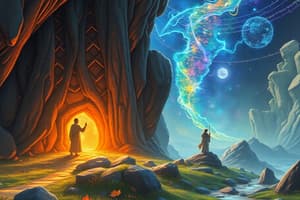Podcast
Questions and Answers
Physics is a branch of Formal Sciences.
Physics is a branch of Formal Sciences.
True (A)
Biology is the study of non-living organisms.
Biology is the study of non-living organisms.
False (B)
Mathematics is a branch of Applied Sciences.
Mathematics is a branch of Applied Sciences.
False (B)
Engineering is a branch of Natural Sciences.
Engineering is a branch of Natural Sciences.
The scientific method starts with making a prediction.
The scientific method starts with making a prediction.
A theory is a tentative explanation for a phenomenon.
A theory is a tentative explanation for a phenomenon.
The seventh step of the scientific method is experimentation.
The seventh step of the scientific method is experimentation.
A variable is a factor that cannot be changed or manipulated in an experiment.
A variable is a factor that cannot be changed or manipulated in an experiment.
Spectroscopy is used to study small objects or structures.
Spectroscopy is used to study small objects or structures.
Chromatography is used to analyze and interpret data.
Chromatography is used to analyze and interpret data.
Empirical evidence is based on theoretical assumptions.
Empirical evidence is based on theoretical assumptions.
Modeling is used to analyze the interaction between matter and electromagnetic radiation.
Modeling is used to analyze the interaction between matter and electromagnetic radiation.
Flashcards are hidden until you start studying
Study Notes
Branches of Science
- Natural Sciences: Study of natural phenomena and laws of nature
- Physics: Study of matter, energy, and the fundamental laws of the universe
- Chemistry: Study of the composition, properties, and reactions of matter
- Biology: Study of living organisms and their interactions
- Formal Sciences: Study of formal systems, language, and logic
- Mathematics: Study of numbers, quantities, and shapes
- Logic: Study of reasoning and argumentation
- Applied Sciences: Practical application of scientific knowledge
- Engineering: Application of scientific and mathematical principles to design and build structures, machines, and systems
- Medicine: Application of scientific knowledge to diagnosis, treatment, and prevention of diseases
- Technology: Application of scientific knowledge to develop new products, processes, and services
Scientific Method
- Observation: Identify a problem or phenomenon to be studied
- Hypothesis: Formulate a tentative explanation for the phenomenon
- Prediction: Make predictions based on the hypothesis
- Experimentation: Design and conduct experiments to test the hypothesis
- Analysis: Analyze the data collected during experimentation
- Conclusion: Draw conclusions based on the analysis
- Communication: Share the results with others
Key Scientific Concepts
- Theory: A well-substantiated explanation for a set of phenomena
- Law: A statement that describes a consistent pattern or relationship in nature
- Hypothesis: A tentative explanation for a phenomenon
- Variable: A factor that can be changed or manipulated in an experiment
- Control: A standard against which the results of an experiment are compared
- Empirical Evidence: Data collected through observation and experimentation
Scientific Tools and Techniques
- Microscopy: Use of microscopes to study small objects or structures
- Spectroscopy: Use of instruments to analyze the interaction between matter and electromagnetic radiation
- Chromatography: Use of techniques to separate, identify, and quantify the components of a mixture
- Modeling: Use of mathematical or physical models to simulate real-world systems or phenomena
- Statistics: Use of mathematical techniques to analyze and interpret data
Branches of Science
- Natural Sciences study natural phenomena and laws of nature, including:
- Physics, the study of matter, energy, and the fundamental laws of the universe
- Chemistry, the study of the composition, properties, and reactions of matter
- Biology, the study of living organisms and their interactions
- Formal Sciences study formal systems, language, and logic, including:
- Mathematics, the study of numbers, quantities, and shapes
- Logic, the study of reasoning and argumentation
- Applied Sciences involve the practical application of scientific knowledge, including:
- Engineering, the application of scientific and mathematical principles to design and build structures, machines, and systems
- Medicine, the application of scientific knowledge to diagnosis, treatment, and prevention of diseases
- Technology, the application of scientific knowledge to develop new products, processes, and services
Scientific Method
- Observation: Identify a problem or phenomenon to be studied
- Hypothesis: Formulate a tentative explanation for the phenomenon
- Prediction: Make predictions based on the hypothesis
- Experimentation: Design and conduct experiments to test the hypothesis
- Analysis: Analyze the data collected during experimentation
- Conclusion: Draw conclusions based on the analysis
- Communication: Share the results with others
Key Scientific Concepts
- Theory: A well-substantiated explanation for a set of phenomena
- Law: A statement that describes a consistent pattern or relationship in nature
- Hypothesis: A tentative explanation for a phenomenon
- Variable: A factor that can be changed or manipulated in an experiment
- Control: A standard against which the results of an experiment are compared
- Empirical Evidence: Data collected through observation and experimentation
Scientific Tools and Techniques
- Microscopy: Use of microscopes to study small objects or structures
- Spectroscopy: Use of instruments to analyze the interaction between matter and electromagnetic radiation
- Chromatography: Use of techniques to separate, identify, and quantify the components of a mixture
- Modeling: Use of mathematical or physical models to simulate real-world systems or phenomena
- Statistics: Use of mathematical techniques to analyze and interpret data
Studying That Suits You
Use AI to generate personalized quizzes and flashcards to suit your learning preferences.




